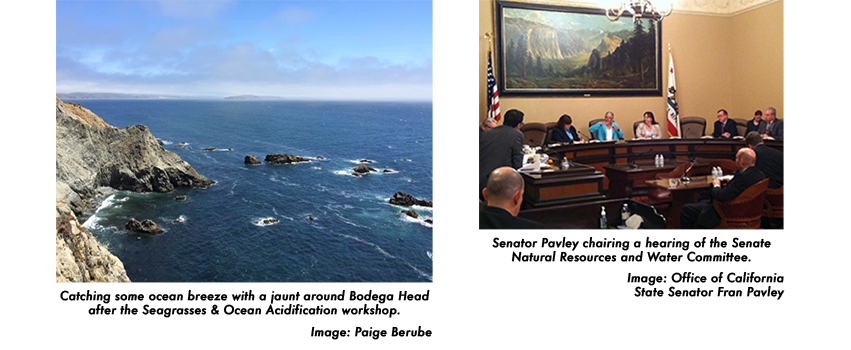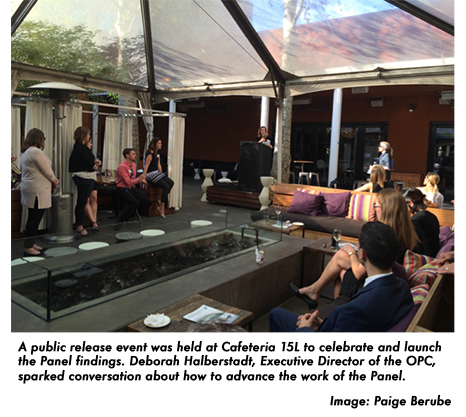January 7, 2016 / Pacific Coast Collaborative / Oakland, CA: My first day as a California Sea Grant State Fellow with the Ocean Protection Council (OPC) was sure to be an exciting and dynamic as I would meet leaders from the Pacific Coast Collaborative Subcommittee on Ocean Acidification (PCC-OA). These leaders are the ocean acidification focused subset of the broader PCC, which represents a collaboration among the governors of California, Oregon, Washington and the premier of British Columbia to address critical climate and energy issues along the West Coast. At this convening, the findings of the West Coast Ocean Acidification & Hypoxia (OAH) Science Panel (Panel) were presented and the PCC-OA leads had an initial conversation about how to implement the recommendations in their jurisdictions.
February 29, 2016 / Senate Committee on Natural Resources & Water / Sacramento, CA: An informational hearing in the Senate Committee on Natural Resources and Water was held in the Capitol, where the Panel co-chair and OPC leadership gave science and management presentations in tandem regarding what California can do to take action on ocean acidification and hypoxia. It was fascinating to hear the dialogue between the Panel scientist, OPC management, and the senators from the Committee.

June 1-2, 2016 / Seagrasses & Ocean Acidification Workshop / Bodega, CA: One of the Panel’s recommendations was to “advance approaches that remove CO2 from seawater.” UC Davis hosted a Seagrasses & Ocean Acidification workshop that included key researchers and representation from management to discuss the potential for seagrasses to ameliorate ocean acidification. It was an incredible opportunity to connect with top scientists in the field that apply their work to inform management and policy decisions.
 June 29, 2016 / OPC Meeting / Sacramento, CA: At the most recent OPC meeting, there was an informational update presented in part by Dr. Tessa Hill, Associate Professor at UC Davis, who described UC Davis’s innovative partnership with the Hog Island Oyster Company and highlighted their investigation on the potential for seagrass beds to modify water chemistry and store carbon near sustainable shellfish aquaculture operations.
June 29, 2016 / OPC Meeting / Sacramento, CA: At the most recent OPC meeting, there was an informational update presented in part by Dr. Tessa Hill, Associate Professor at UC Davis, who described UC Davis’s innovative partnership with the Hog Island Oyster Company and highlighted their investigation on the potential for seagrass beds to modify water chemistry and store carbon near sustainable shellfish aquaculture operations.
I’m excited to see where the second half of my fellowship leads as I continue to work with dedicated and inspiring colleagues who keep a solution-oriented outlook to addressing changing ocean conditions such as ocean acidification and sea-level rise, sustainable fisheries and marine protected areas management in our beautiful state of California.
Written by Paige Berube



